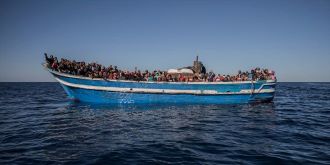
Drowning Letters 2020
Distributed by Pragda, 302 Bedford Ave., #136, Brooklyn, NY 11249
Produced by Paula Palacios and Morada Films
Directed by Paula Palacios
Streaming, 91 mins
High School - General Adult
Human rights; Immigration
Date Entered: 06/21/2022
Reviewed by Kimberly A. Plassche, Map Librarian, Liaison to Geography, University at BuffaloDaily, we hear about the movement of people across national borders in news media. We understand, at a very basic level, that there are migrants seeking better opportunities. Refugees are fleeing war, slavery, and death. Media reports on the politics of the migrant crisis, but the human side is rarely seen aside from the occasional reporting of statistics from the United Nations High Commissioner for Refugees. As a result, we are blinded by the staggering number of displaced people, the monetary cost, and the debated global impact. However, the individual experiences of those men, women, and children fleeing their homes are often lost in the reporting.
Drowning Letters introduces viewers to the experiences of the people. Throughout the film, women and children read letters to their families detailing the strife and loss they experienced when turned away at every step on their way to a safer life in Europe. These letters never reached their intended recipients. The voice-overs accompany scenes of violence, pain, and heartache. Viewers witness migrant families reluctantly forced from their homes, infants dying at sea, coast guard boats patrolling the Mediterranean, and volunteers fighting the clock to save refugees.
As the documentary details, in 2017 Italy began training the Libyan coastguard to locate and prevent migrant boats from landing on European shores. When the military personnel are successful at capturing these refugees that have traveled so far already, they are taken to prison "camps" in Libya. The outlook isn't brighter for those that do reach Europe, as they now camp out in city streets and are likely to be violently forced away by police forces.
"Everything we do is not for the NGO or for us, but for the people at sea." Volunteers aboard an Open Arms rescue boat discuss an upcoming mission to save hundreds of migrants adrift at sea. They face many challenges, including weather, starvation, and Italian and Libyan military officers working to turn migrants away from European shores. Drowning Letters is a heartbreaking film and nearly impossible to continue watching, except for the hope to see the hundreds that have suffered reach a safe and warm place. Due to the dark themes, this film is not recommended for younger viewers, but is an important addition to high school, college, and public libraries. Although the outcome is devastating for many of the people filmed, this documentary reveals the side of the story we often miss and will inspire viewers to emulate the passion of the migrants and rescue workers as they strive for better lives and a just world.
Awards:Goya Awards, Best Documentary Film Nominee; Malaga Film Festival, Audience Award; Ourense Film Festival, Audience Award; CIMA Award for Best Director
Published and licensed under the Creative Commons Attribution 4.0 license. Anyone can use these reviews, so long as they comply with the terms of the license.